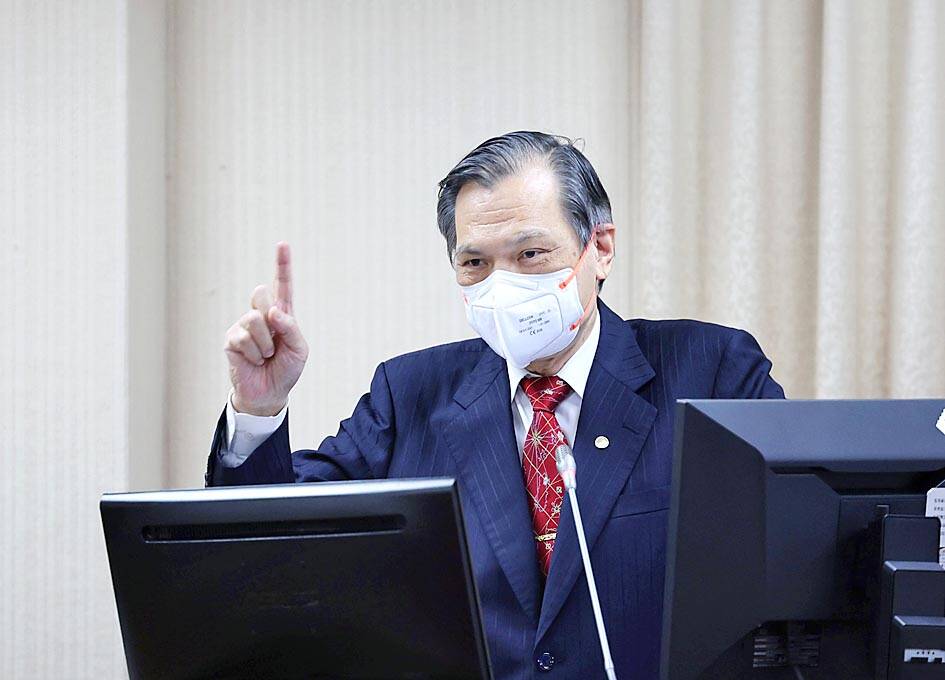China stands no chance of winning in an attempted invasion of Taiwan, National Security Bureau Director-General Chen Ming-tong (陳明通) said yesterday.
Chen made the remarks during a question-and-answer session at the legislature in Taipei after Chinese Nationalist Party (KMT) Legislator Lee Guei-min (李貴敏) asked him about US Chief of Naval Operations Michael Gilday’s comment on Wednesday that China could attack Taiwan as soon as this year or next year.
“A military invasion of Taiwan will lead to international sanctions and diplomatic isolation, [and Chinese President Xi Jinping, 習近平] would be to blame for sinking any hopes of a great ‘Chinese revival,’” Chen told a news conference.

Photo: CNA
Both sides of the Taiwan Strait should respect each other and develop their own countries, he added.
Many scenarios have been put forward regarding China’s “readiness” to invade Taiwan, Chen told lawmakers.
The more recent theories suggesting an invasion date of as early as next year to 2025 might be based on China’s attempts to force Taiwan to the negotiation table by threatening war, he said, without specifying what the negotiations could involve.
This could be carried out through a show of military force, for example by blockading Taiwan, which would be tantamount to war, Chen said.
The nation’s security apparatus has drafted plans to respond to such a scenario, he added.
Due to the ever-changing nature of warfare, it is difficult to predict exactly when a Chinese invasion could take place, Chen said.
The bureau takes note of all suggested timelines and is always on the lookout for any signs of a possible invasion, he added.
KMT Legislator Johnny Chiang (江啟臣) cited Ministry of Economic Affairs data showing that in the event of a blockade, Taiwan would only have 146 days of oil, 10 days of liquefied natural gas and 39 days of coal in its reserves.
“If we do not have power, it would not matter if we have Taiwan Semiconductor Manufacturing Co (台積電),” Chiang said.
Chen said he was not at liberty to respond to Chiang’s remarks.
Asked by reporters about Xi’s remarks during the Chinese Communist Party National Congress on Sunday that Beijing would not give up on the use of force to occupy Taiwan, Chen said Xi’s words were “cliche.”

CHAOS: Iranians took to the streets playing celebratory music after reports of Khamenei’s death on Saturday, while mourners also gathered in Tehran yesterday Iranian Supreme Leader Ayatollah Ali Khamenei was killed in a major attack on Iran launched by Israel and the US, throwing the future of the Islamic republic into doubt and raising the risk of regional instability. Iranian state television and the state-run IRNA news agency announced the 86-year-old’s death early yesterday. US President Donald Trump said it gave Iranians their “greatest chance” to “take back” their country. The announcements came after a joint US and Israeli aerial bombardment that targeted Iranian military and governmental sites. Trump said the “heavy and pinpoint bombing” would continue through the week or as long

TRUST: The KMT said it respected the US’ timing and considerations, and hoped it would continue to honor its commitments to helping Taiwan bolster its defenses and deterrence US President Donald Trump is delaying a multibillion-dollar arms sale to Taiwan to ensure his visit to Beijing is successful, a New York Times report said. The weapons sales package has stalled in the US Department of State, the report said, citing US officials it did not identify. The White House has told agencies not to push forward ahead of Trump’s meeting with Chinese President Xi Jinping (習近平), it said. The two last month held a phone call to discuss trade and geopolitical flashpoints ahead of the summit. Xi raised the Taiwan issue and urged the US to handle arms sales to

State-run CPC Corp, Taiwan (CPC, 台灣中油) yesterday said that it had confirmed on Saturday night with its liquefied natural gas (LNG) and crude oil suppliers that shipments are proceeding as scheduled and that domestic supplies remain unaffected. The CPC yesterday announced the gasoline and diesel prices will rise by NT$0.2 and NT$0.4 per liter, respectively, starting Monday, citing Middle East tensions and blizzards in the eastern United States. CPC also iterated it has been reducing the proportion of crude oil imports from the Middle East and diversifying its supply sources in the past few years in response to geopolitical risks, expanding

Pro-democracy media tycoon Jimmy Lai’s (黎智英) fraud conviction and prison sentence were yesterday overturned by a Hong Kong court, in a surprise legal decision that comes soon after Lai was jailed for 20 years on a separate national security charge. Judges Jeremy Poon (潘兆初), Anthea Pang (彭寶琴) and Derek Pang (彭偉昌) said in the judgement that they allowed the appeal from Lai, and another defendant in the case, to proceed, as a lower court judge had “erred.” “The Court of Appeal gave them leave to appeal against their conviction, allowed their appeals, quashed the convictions and set aside the sentences,” the judges